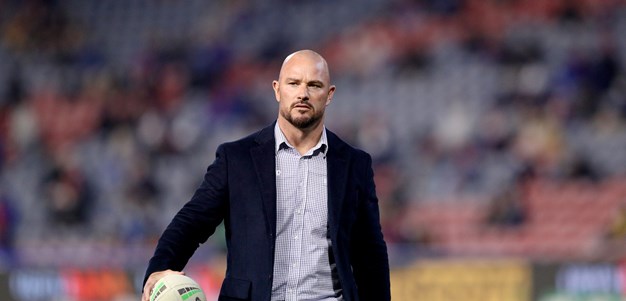
When Mark deWeerd joined the NRL nine years ago, programs supporting Aboriginal and Torres Strait Islander communities were few and far between.
"Now the work we do has become core business for all clubs," said deWeerd, the NRL's general manager of Indigenous strategy.
"It's part of the make-up of the game nowadays that our social reach is having such an impact. It's not seen as a nice thing to do; it's seen as a must-do for the game and for our clubs."
The NRL celebrated Indigenous Round last week, but its acknowledgement and support of First Nations people is not a one-off. Many clubs host, produce and promote Indigenous-focused initiatives.
Brisbane are among the leaders in this space with their Beyond the Broncos mentoring program that aims to improve school attendance and Year 12 achievement rates for Aboriginal and Torres Strait Islander students in eight greater Brisbane high schools.
The Broncos also have the Beyond the Broncos Girls Academy, which helps develop the next generation of female Aboriginal and Torres Strait Islander leaders, and the Beyond the Broncos Volunteer Tutoring program for university students.
"The Broncos provide huge opportunities for young girls in particular to be successful and make a difference in their lives and communities by developing leadership skills," deWeerd said.
Addo-Carr: Why it's a special week for our people
The Rabbitohs are very active in the Indigenous community.
Among the club's many initiatives is the Nanga Mai Marri (translating to "dream big" in Gadigal language) program, helping Aboriginal students in their area from Year 10 until six months after the HSC.
"The Rabbitohs have got a number of programs that they run through Souths Care and target Indigenous people at all levels, whether that's school programs or programs for adults," deWeerd said.
"They work across a huge area as well so they don't limit their reach, which is great for the community being able to gain access to an amazing brand that has done a lot for the Indigenous community."
And that's only a tiny snapshot of what clubs are doing.
"The clubs as a whole do an amazing job with engaging the Aboriginal and Torres Strait Islander community," deWeerd said.
"Programs like what the [Cronulla] Sharks do around health and their partnership with Deadly Choices are really good examples of how clubs go above and beyond and use the profile of their clubs and the game to have a have a huge effect in the communities."
As well as Cronulla, the Eels, Titans, Broncos and Cowboys are also affiliated with Deadly Choices.
North Queensland have broken new ground in other areas.
"The Cowboys through Cowboys House, which houses Indigenous youth in their boarding facilities to allow them to gain access to a quality education, is probably a flagship initiative," deWeerd said.
"It's one that will definitely have an impact on our remote communities and Indigenous youth that otherwise wouldn't get the same opportunity to attend school and have access to the role models they do through the Cowboys.
"It's not only the impact it has on those young people. Those young people then become role models for other young people … We'll just see a changing of the guard and generational change by these young people participating in these programs."
Wests Tigers, in conjuction with the KARI Foundation, run an annual five-day Indigenous Elite Pathways camp where teenage talents learn about rugby league, leadership and culture. The Tigers also deliver the Get Out, Get Deadly program at Cobham Youth Justice Centre.
Truth-telling at forefront of Indigenous Round
Elsewhere, the Gold Coast Titans have the Deadly Futures program, delivered in partnership with the Preston Campbell Foundation, for high school students. Learning topics include Indigenous timelines, cultural identity and career aspirations.
Newcastle are linked with the Cultural Choice Association of player Connor Watson, who established Boots for Brighter Futures.
Eleven clubs - the Raiders, Bulldogs, Sharks, Titans, Storm, Knights, Eels, Panthers, Dragons, Roosters and Tigers - are part of the NRL School to Work program.
Introduced in 2012, School to Work assists Indigenous students with the transition to tertiary education or meaningful employment. More than 2000 students have graduated through the program, with 96 percent achieving their HSC last year.
"The benefit is they have mentors and support staff to guide them through their education," deWeerd said.
"What the game does do well is continue to support all of our participants once they leave our programs.
"All of our clubs and the staff that work on these programs continue to provide that support for as long as it's needed.
"Students are enrolling in university, they're now becoming doctors and vets and participating in roles that Indigenous people have struggled to break into for a number of years."
The NRL reached Elevate status for its 2018-2022 Reconciliation Action Plan - being the first national sporting organisation to do so.
Further showing commitment to Indigenous issues, the NRL has pledged its support for the Uluru Statement while cultural training is provided to employees.
"One of the privileges of working in the game is being able to have such an impact," deWeerd said.
"We saw that in Indigenous Round. People have pride in what we do as a game, the impact that we have and the stand we take."



